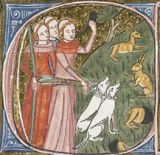 |
 |
 |
 |
 |
 |
 |
|
|
Light relief: hospitality and hunting - entertainment and relaxation The granges were not simply agricultural and industrial centres, but might serve as hospices for passing guests, as well as members of the monastic community and notable persons. Henry III (1216-1272) stayed on Fountains' estates at Kirkby Malzeard in 1244. The king was evidently satisfied with the hospitality he received for, as a mark of his gratitude, he granted the community three casks of wine, one for the celebration of the Mass, one for the monks' infirmary and one as a refectory pittance.(39) A master of guests was appointed to care for visitors to the grange, and he was granted certain concessions regarding speech.(40) Women were not permitted to stay on the granges, and early legislation forbade them from entering the court unless this had been authorised by the abbot or prior.(41) Not every grange would have had a hospice, but Fountains is known to have had provision of this kind at Kilnsey, Swanley and Sutton. The importance of hospitality at the latter grange is attested by Abbot Marmaduke Bradley's (1536-39) refusal to lease it to the royal commissioners as, he maintained, it was required for hospitality. (42)
By the later Middle Ages at least, the abbots of Fountains favoured certain granges as retreats for themselves and for the entertainment of distinguished guests. Those whom the abbot entertained on his granges would likely have dined in style, and an inventory of the silver at Brimham grange mentions a silver chalice and goblet, a silver salt cellar and seven silver spoons which were for the abbot's use.(43) The Bursar's Account Book of Fountains Abbey reveals that in 1457 Abbot Greenwell entertained the duke of York at Swanley grange, which lay to the north of the abbey precinct. The duke (who was, in fact, the father of the future kings, Edward IV and Richard III) was served fish bought from a Dan Henry at 2s 8d.(44)
There is no indication in the fifteenth-century accounts that either the duke of York or any other guests at Fountains' granges, were entertained by fools, minstrels or fabulists.
|
